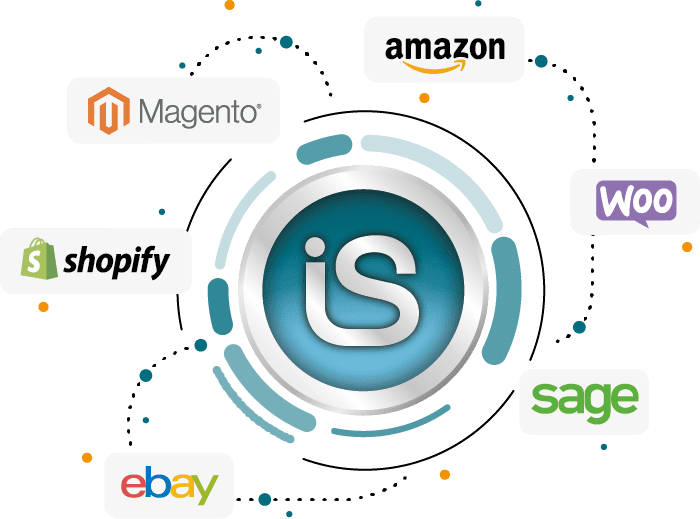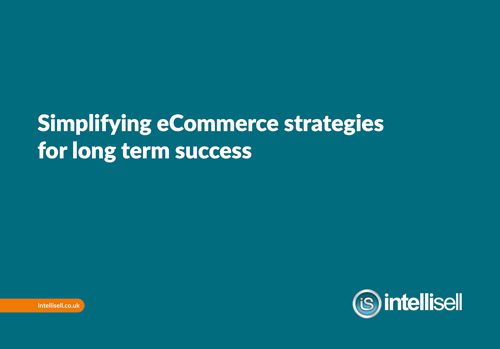Sage eCommerce for distributors
Service and grow your business with Intellisell


Sage eCommerce for distributors
A robust ERP system with an integrated eCommerce platform, like Intellisell is a foundation on which to grow your wholesale or distribution business.
Connect your sales and marketing efforts in new and existing channels with your operations and warehouse to give you tighter control and improved performance. With Sage at the core of your organisation, Intellisell takes its wealth of data and logic to connect people and processes across your organisation and through your entire supply chain.
Functionality for your business
Test new products in new channels
Intellisell works with all of the leading marketplaces and can easily integrate with the latest platform. From Amazon, eBay and Wayfair to social ‘buy now’ capability, we can help you turn on and trial new opportunities.
Business intelligence to improve product
Take pre and post purchase data, gather insight into product satisfaction and monitor customer returns to help product development teams, sales and marketing.
Warehouse, courier, 3PL and drop-shipping
Use Intellisell to link your Sage ERP with other software and departments such as goods-in, warehouse or logistics partners to improve operational efficiency.
Sage integration as standard
Written for Sage ERP, Intellisell uses the power and logic of your Sage 200, Sage 1000, Sage Intacct or Sage X3 solution to share product, pricing or customer-specific detail up to improve efficiency.
Automate processes, develop workflows
Automate routine tasks across your business to improve workflow and increase efficiency, saving time, minimising errors and reducing operating costs.
D2C and M2C omnichannel experience
For most companies, the best plan is to start small – try out a small niche of the product set, for example via leading marketplaces like Amazon or eBay, Shopify. Intellisell can help support you with your fulfilment process, with monitoring through a single dashboard.
Testing which marketplaces is where Intellisell integrated data with live reporting is invaluable. It can provide immediate feedback into consumer demand for products, as well as insight into potential changes required to optimise the fulfilment model. Integrating Sage with Intellisell will a dashboard view of operations, delivering affordable, cloud-based, immediate information to everyone that needs it across the business.

Call us on 0344 880 6140
or chat with an expert.
Want to book a consultation with an eCommerce distribution expert?
General Contact Form
Sage Intacct
Accelerate your business online with multi-channel web analytics and Sage Intacct data combined you can drive improved decision-making.
Sage 200
Intellisell integrates with your Sage 200 solution to manage your business requirements, multi-site operations and compliance.
Sage X3
Used as an integration platform you can connect departments to Sage X3 making you more efficient and flexible to changes in customer demand or new opportunities.
Sage 1000
Seamless integration, cloud-hosted and connections to third-party suppliers. Improve customer service, warehouse and distribution management.
Resource Centre
B2B customer expectations are changing
Consumer buying habits influence their business expectations Digital self-service tools are present for every step of the buying – and rebuying – process. Customers now expect information to be...
eCommerce Marketing Strategy Ideas for the new financial year
The rise of online sales has transformed the role of marketing within B2B companies – good marketing is now vital to business success. Customers have high expectations of the quality of imagery and...
How can you boost customer retention?
Customer experience can make or break any business. From the initial product research, through the sales process, delivery and response to any problems, the speed, quality and relevance of response...
Intellisell’s integration with Ravensden’s Sage ERP 1000 software
Ravensden wanted to provide its customers with an alternative method of ordering that was fast and reliable, to showcase its wide product range. With such a broad range of products in Ravensden’s...
B2B customer expectations are changing
Consumer buying habits influence their business expectations Digital self-service tools are present for every step of the buying – and rebuying – process. Customers now expect information to be...
FAQs
What is an eCommerce system or platform?
It is a system that enables electronic payments online. There are different ways that merchants can offer these payments. Some choose to offer fully integrated software solutions or third-party systems managed by service providers such as PayPal and WorldPay.
Many components make up an eCommerce system. These features could include; the shopping cart, integration capabilities, and security infrastructure. Each offers an important part in making sure that the system runs efficiently for both the merchant and their customers.
eCommerce integration involves implementing a shopping cart, merchant accounts, payment gateways, and security mechanisms with your website. This all helps to provide the merchant with an eCommerce system and a seamless shopping experience for the end customer.
So if we think of the software as the engine behind the scenes of an online store, then the system enables electronic payments. The software manages inventory, allows you to add or remove products, calculate the charges, order fulfilment etc.
By way of showing a friendly user interface people from non-technical backgrounds can manage the entire eCommerce operation. The back end of the interface is very multifaceted and a complex machine.
Any viable eCommerce software will enable customers to buy your products and services from your online store. Where solutions differ is the degree to which they can unify and leverage both front and back-office applications with both their unique and shared data. eCommerce platforms provide the unification of core business processes, where businesses can gain complete visibility across their company and ultimately meeting their most discerning customers’ expectations.
An eCommerce platform should allow for integrations between separate systems including; accounting, POS, inventory and order management, marketing, merchandising, customer service and financials on a cloud-based platform.
The benefits of having the software integrated allows you to provide reliable, consistent and personalised cross-channel experiences. You can offer superior customer service through a single view of all interactions and transactions across all touchpoints and channels.
You can also go above and beyond your customer expectations and increase your revenue by taking control of your orders and have one single view of what inventory you have across multiple channels and supply chains.
What are the most common types of eCommerce Software?
On-Premise: These are managed onsite by developers who take control of the manual updates and carry out any fixes that may need to be resolved. It offers merchants flexibility over hosted solutions. However, SaaS is becoming the preferred option, which you can discover more about below.
SaaS: Software as a Service (or “hosted”) solutions are much more detached from developers, in simple terms it isn’t maintained through company hard drives, you access it via the internet
The only requirements from development teams are usually for supplementary custom design features. You will be able to action any updates with one click or they happen automatically. This makes it a better choice for online merchants. It saves time for eCommerce stores using SaaS software and it’s also so much cheaper than on-premise solutions.
What is an Enterprise Resource Platform (ERP) eCommerce integration?
This is referring to the automation between the back office and the website. Automatic updates of product, price, stock and then the processing of customer and order details.
What is a payment gateway?
A payment gateway is a technology used by merchants to accept debit or credit card purchases from customers. So once you hit the buy button on a website, the payment gateway comes into action.
The next step is adding your bank card details. It is the front-end technology in charge of sending customer information to the merchant acquiring bank, for processing.
It then returns the transaction details and response from the payment network to the website you purchased from to inform them that the card is authorised, and therefore the order is completed.
In physical stores, payment gateways consist of the point of sale (POS) terminals used to accept credit card information by card or by smartphone. In recent years have begun accepting phone-based payments using QR codes or Near Field Communication (NFC) technology.
In online stores, payment gateways are the “checkout” portals used to enter credit card information or credentials for services such as PayPal.
Now that we have chip technologies, the signature phase on a credit/debit card has been replaced with a personal identification number (PIN) entered directly into the payment gateway hardware.
Contactless purchases are now so popular, and most of us now use our phones as payment devices instead of plastic credit cards.
Get in touch to see
Intellisell in action
Accelerate your business today with an agile all in one eCommerce solution
General Contact Form
This site is protected by reCAPTCHA and the Google
Privacy Policy and Terms of Service apply.








